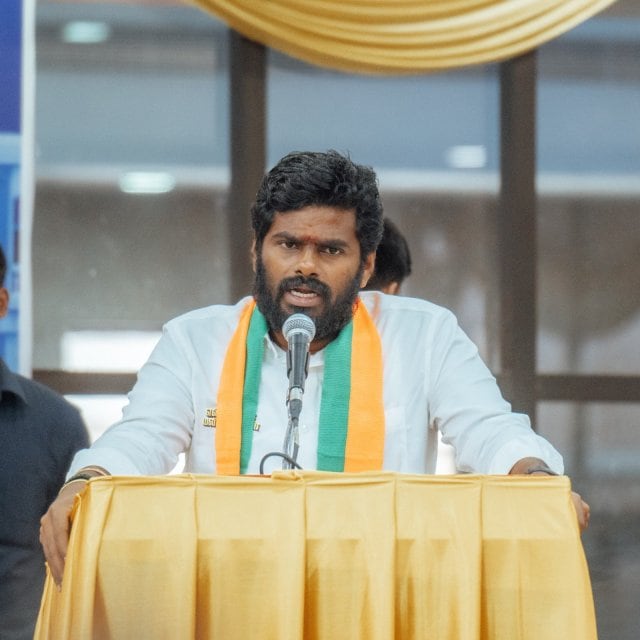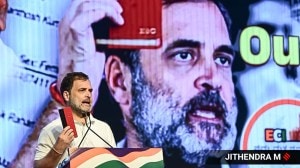In jolt to Annamalai, HC dismisses his quash plea in hate speech case
Justice Venkatesh states that TN BJP chief's pre-Diwali remarks against a Christian NGO over bursting of crackers were prima facie aimed at inflaming communal tension
 K Annamalai, the Tamil Nadu BJP president. (File photo)
K Annamalai, the Tamil Nadu BJP president. (File photo)The Madras High Court on Thursday dismissed a petition filed by K Annamalai, the Tamil Nadu BJP president, which sought quashing of the criminal proceedings against him in a hate speech case.
The case stemmed from allegations that Annamalai, in an interview with a YouTube channel just two days before the 2022 Diwali, made divisive remarks that a Christian NGO was behind a legal challenge in the Supreme Court to the bursting of crackers during the festival in its bid to attack the Hindu culture.
Rejecting Annamalai’s plea, Justice N Anand Venkatesh passed an order that not only addressed the specifics of the case but also delved into the ramifications of hate speech in the society.
Underlining that the “persons of influence, keeping in view their reach, impact and authority they wield on general public or the specific class to which they belong, owe a duty and have to be more responsible,” the high court said such personalities “are expected to know and perceive the meaning conveyed by the words spoken or written, including the possible meaning that is likely to be conveyed”.
Annamalai’s petition was based on the argument that his comments had not caused any disturbance to public tranquility so far.
In his order, Justice Venkatesh however made reference to the apex court’s rulings to flag the potential of hate speech to act as a “ticking bomb”.
The high court’s order said, “… (The) psychological impact of a statement made by a popular leader must not be merely confined by testing it only to immediate physical harm. It is the duty of the court to see if it has caused a silent harm in the psyche of the targeted group, which, at a later point of time, will have their desired effect in terms of violence or even resulting in genocide.”
The high court elaborated on the heightened responsibility of public figures to refrain from making statements that could sow discord among communities. It examined the evolution of laws against hate speech, tracing it back to the English law, “De Scandalis Magnatum” from the 13th century, which had prohibited false news.
Justice Venkatesh found that Annamalai’s statements – especially its edited 6.5-minute clip shared on the official X handle of the Tamil Nadu BJP – prima facie amounted to an attempt to create enmity between Hindus and Christians. The judge noted the timing of the state BJP chief’s remarks and its targeting of a Christian NGO were prima facie aimed at inflaming communal tension.
Justice Venkatesh observed the role of religion in society, quoting Karl Marx’s assertion that religion is the “opium of the people” to caution against the misuse of religious sentiments. His ruling underscored the judiciary’s commitment to uphold the secular fabric of India, as enshrined in the Constitution.
The high court’s ruling also referred to the thoroughness of the order by a judicial magistrate in Salem, which had issued summons to Annamalai on a complaint filed by V Piyush, who accused the BJP leader of having made a hate speech against Christians in his October 22 YouTube interview. It commended the magistrate’s reasoned approach and highlighted it as an additional ground for refusing to quash the case.
“A judge, who decides these kinds of cases, cannot be sitting in a pulpit nor would ignore what is happening in the society during the relevant point of time. A judge, who is holding a constitutional position, has taken his oath on the Constitution of India and therefore, he is duty bound to ensure that the basic features of the Constitution and the fabric of this country are not attempted to be destroyed,” said Justice Venkatesh.
Balancing freedom of speech with the imperative to maintain communal harmony in a diverse country like India, the high court’s ruling sent a message against the use of hate speech by public figures, even as it noted that Annamalai would be entitled to defend himself against the charges before the magistrate.
Justice Venkatesh quoted the words of the Supreme Court Justice P B Gajendragadkar from the 1966 Constitution Bench verdict in Yagnapurushdasji Vs Muldas case, reflecting on the pluralistic nature of Hinduism and the composite character of India’s population, to contextualise his order within the larger framework of India’s rich cultural and religious ecosystem.












